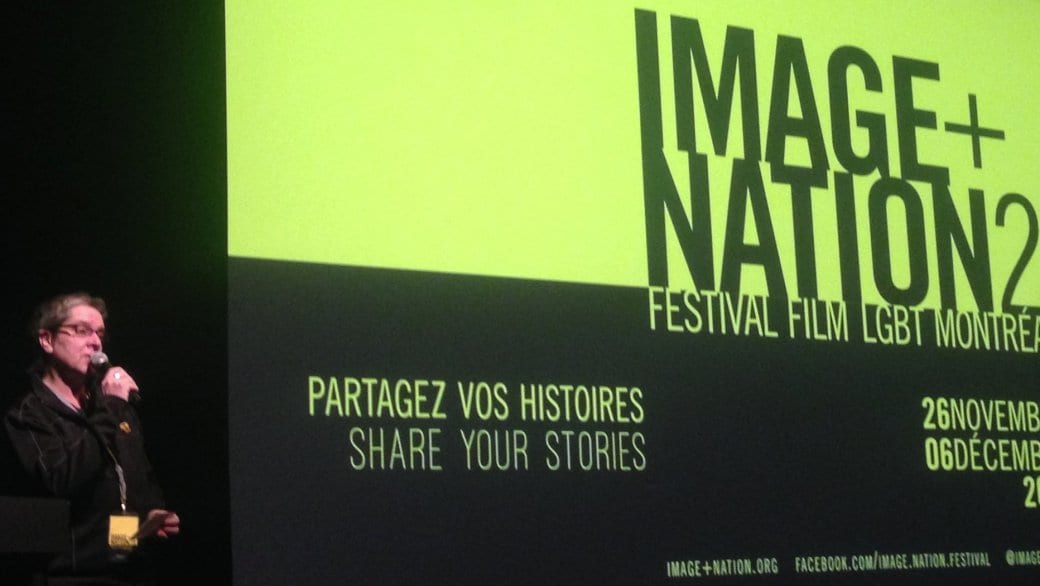A group of filmmakers and community activists are incensed that Montreal’s queer film festival, which accepted funding from the Israeli consulate in 2015, has not responded to an open letter requesting festival organizers discontinue any partnerships with the state.
“It was sent out on Jan 7. To date, they have not even acknowledged receiving the letter,” says Ryan Conrad, a filmmaker and lecturer in Film Studies at Concordia University, who co-authored the document.
The letter, which criticizes Image+Nation (I+N) for supporting “pinkwashing” and demands the festival “fully disclose and discontinue its financial relationship with the state of Israel at all future festivals and events,” has over 50 signatories, including past contributors who are unhappy about seeing their work alongside an Israeli emblem.
“I was proud . . . to contribute a couple of historical programs to last year’s festival, but my pride turned to shame when our logo appeared alongside that of the Israeli pinkwashing campaign,” Thomas Waugh, cinema professor at Concordia University writes in an email.
Pinkwashing refers to the allegation that the state of Israel’s espousing of progressive values, such as protecting gay rights, is a diversion strategy to distract the public from scrutinizing its systemic human rights abuses against Palestinians.
This is not the first time Israeli support has caused controversy at queer film festivals in North America. San Francisco’s Frameline has faced criticism for years for accepting funding from the Israeli consulate, while the Vancouver Queer Film Festival faced criticism in 2014 for accepting an ad in its program from a pro-Israel group.
“I just don’t understand how they came to make the decision [to accept Israeli funding] knowing that this would alienate and upset many former contributors,” says Conrad, who pulled his own film from Frameline in 2013. “This is allowing the Israeli government to have the cultural capital of appearing LGBT-friendly. It is all part of their rebranding campaign, using queer people as pawns to appear more democratic while not speaking about apartheid and human rights abuses.”
“We have every intention of addressing these issues but are taking the time to reflect,” says Charlie Boudreau, executive director of I+N. “We want to address problematic issues in the films we show at the festival. We believe that the festival is a place of learning and exchange, and a place of critique.”
In 2015, I+N received $1,500 from the Consulate General of Israel. According to Boudreau, the money was used to help pay for screening Hands Untied: Looking for Gay Israeli Cinema, a French and Israeli documentary that critically examines the role of gay film in the history of Israeli cinema.
“The film speaks of a society that excluded LGBT people, and talks about how the community evolved within that culture,” she explains. “I am not sure how showing a film which denounces what the Israeli state is doing contributes to making Israel look any better.”
“The Israeli films we show are very critical in nature, and really do speak to what we believe is a problematic apartheid state of Israel,” adds Katharine Setzer, who manages I+N’s programming.
But the films screened by I+N rarely capture Palestinian perspectives, says the co-founder of a queer Palestinian group in Montreal. “Although films like The Bubble or Out in the Dark aim to portray Palestinian society in a way that is more diverse or complex, they still reassert zionist tropes,” says Gabriel Salamé, co-founder of AlMassir. “In those movies, it is Israeli filmmakers writing about Israeli and Palestinian society. Palestinians are not given a real voice.”
Although I+N says its film selection process is not affected by receiving Israeli funds, the festival recognizes Israel as a sponsor. The consulate’s logo is prominently featured on the festival’s marketing materials, and is displayed in the opening credits of all films in the festival.
“They give us money, we give them visibility,” Boudreau says. “We collaborate with consulates to facilitate the representation of minority voices of different countries in our event, and to enhance our outreach to wider communities, making LGBT part of their cultural discourse.”
According to Boudreau, I+N is the only LGBT film festival in Canada that does not receive any provincial support. Every penny the festival can get helps it meet its goal of bringing an array of international LGBT films to audiences in Montreal, she says.
“I think that art has always been a voice for change. To cut that voice down makes me very uncomfortable,” Boudreau says.
“And where does that start and end?” she asks. “We can’t take Israeli funding, but does that mean we can’t take Israeli-funded films? Where does this censorship stop? It seems like a slippery slope.”
Editor’s note: This article was corrected on March 8, 2016 to clarify that the Vancouver Queer Film Festival was criticized for accepting an ad from a pro-Israel group in its program in 2014.

 Why you can trust Xtra
Why you can trust Xtra


